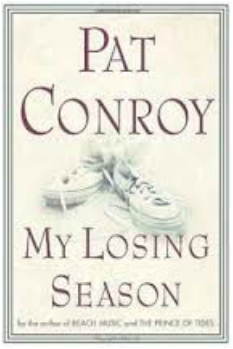 It was years ago in the early 2000's that I was handed My Losing Season by Pat Conroy. Prior to this, I had not explored much within the field of high interest sports literature, but I gave it a shot. As I tell all of my students, it only takes one person to flip the switch and make the light go on. I believe My Losing Season did that for me, which is why I was quite sad to hear of Conroy's passing last week. While his most talked about works may be The Prince of Tides and Beach Music, My Losing Season was one of his rarer books of nonfiction. In My Losing Season, Conroy re-creates his pivotal senior year as captain of the Citadel Bulldogs. He chronicles the highs and lows of that 1966–67 season, his tough disciplinarian coach, the joys of winning, and the hard-won lessons of losing. Most of all, he recounts playing a sport that would become a metaphor for his passage into manhood. There were so many things I loved about this book. I loved the idea of finding a silver lining in losing. As someone who was part of a great many losing seasons, most of my teams resembled hard-luck causes--and that's fine by me. Most post-prime athletes would be happy to recount names and stories rather than scores and records any day. Ultimately, it was what I personally gained from the experience that was immeasurable. As they say in sports, sometimes the greatest contributions are not found in a boxscore. Anyways, I felt a certain kinship with Conroy for this reason, and perhaps it's what made me love the book so much. I felt he wrote for me and the type of scrappy, dedicated, and quite average athlete I was. Another layer of the story dealt with his life growing up and details of his abusive father and how it related to his basketball career. About the time this book hit my lap, I was newly entrenched in the experience of raising my own children. The book made me think about parental roles in the athletic life of kids. Though I really had the opposite experience growing up, it made me consider the negative role of fear in both parenting and coaching. There is immeasurable power and trust involved in both fatherhood and coaching. Conroy pulled no punches in exploring the massive influence of these relationships on young men. Until My Losing Season, I had never quite read a sports story I would consider beautifully written. I'm sure they existed, just not in my world yet. My Losing Season read like this gnawingly complex fictional tale, but it was true. I remember constantly turning back to the Citadel team picture that graced the inside if the book cover just to do a pinch test to reaffirm that these characters in the story were indeed real. Conroy was just so damn honest! In an age where athletes trumpet their every success, Conroy leaned on failure to tell his story, showing how tremendous personal growth can spawn from the things that hurt us the most. I consider Conroy to be the father of my love for nonfiction sports lit. In writing about sports, he showed you have to be human first. Thanks, Mr. Conroy, for the inspiration--your books will always be on my shelves and in my heart.
2 Comments
|
Archives
March 2023
Categories
Categories |
 RSS Feed
RSS Feed